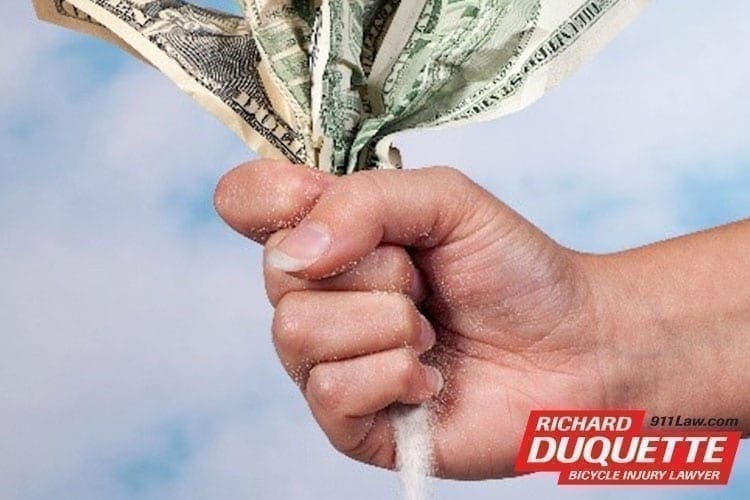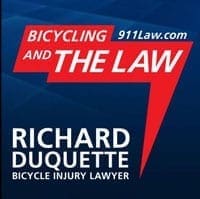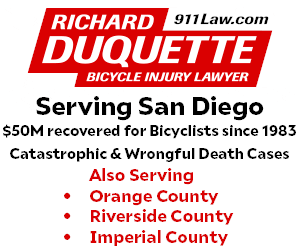By Richard Duquette, Esq, Law Firm of Richard Duquette
Listen to the Podcast
It’s common to receive phone calls seeking legal representation for “small” bicycle injury cases. My intent in this article is to give you a realistic perspective, so you can decide how to proceed in small injury or damaged bicycle cases.
Let’s start with a historical view. Looking back over thirty years of handling bicycle injury cases, I can tell you the legal playing field has tilted in favor of the big insurance corporations.
In the early ’80s even “small” cases could be fairly settled out of court, for three times the medical bills. This gave the victims money for pain and suffering on top of attorney fees and medical costs. So, a case with $1,000.00 in medical bills would settle for $3,000.00.
As the insurance industry, pumped millions of dollars into tort reform via advertising and politics, life changed for consumers, including bicycle crash victims. Currently, it’s commonplace to see a settlement offer of only $1,000.00 on a $3,000.00 case, with an offer to pay only your medical bills. Of course, this is hypothetical, but you get the point. Attorney fees and victim pain and suffering have taken a big hit.
So, what’s a small case?
Generally, a small case is where there is proof of clear liability or fault, but limited damages. I’m referring to bicycle damage or temporary injuries like a sprain, strain, whiplash, abrasions and contusions. Even small non-displaced fractures fall into the “small” case category, because they are not permanent, nor do they generate a lot of medical costs, or lost wages. By no means as I minimizing the trauma, fright or change of lifestyle of such an injury; including bicycle damage losses.
Whereas, a large case involves serious injuries, broken bones, displaced fractures, head injuries and even death. Most serious cases require surgery, and victims often sustain permanent disability.
Enter the computer era. When I first started practicing law in 1983, I typed on an IBM typewriter. With computers, the insurance industry got clever and generated litigation programs to standardize the claims negotiation process. That’s right, your case may now be handled by a computer called “Colossus”. Allstate is famous for this. In many companies, the hands of the front-line claims adjusters are tied. Their discretion is limited.
Then came the appointment of judges and politicians who developed anti-consumer laws and decisions. Such punitive laws factor into whether a lawyer will take your “small” case. Let me show you how.
One law that has been abolished is what’s known as the collateral source rule (Howell v. Hamilton Meats case). Historically, when you pay for health insurance, the law for decades was pro-consumer. It rewarded citizens who invested their hard-earned money into paying premiums and obtaining healthcare. They could claim the full medical bill in court, not the HMO/PPO reduced or discounted rate. Insurance reductions or deductions per the HMO/PPO plans were irrelevant. For example, a $100.00 medical bill was just that. Now you only get to submit $50.00 (the discounted rate) to a claims adjuster or jury. In effect, your case has been devaluated. This misleads the jury because they will never see the true correlation between medical costs and harm.
Then came new case law from the United State Supreme Court in the area of Erisa, (U.S. Airways v. McCutchen case). In many instances, now your work self-funded HMO/PPO medical plans require you pay them back at 100% for any bills they paid if you recover from a negligent motorist. That’s right, you pay premiums and your health plan only “loans” money to you, in a sense, by paying your bills. This is called reimbursement or subrogation. So, your health benefits are illusory to a degree. Luckily, I’ve studied this area of law for years and know most of the exceptions to the reimbursement laws. This means that the $1,000.00 offer to settle your “small” case, must be paid back to United Health Care, Kaiser, and Blue Cross etc. Which means you get a zero net settlement.
To top it off, if you’re Medicare qualified, that’s another reimbursement maze lasting at least six months to get a final amount certain so you can negotiate a settlement. Uncle Sam is now involved in your case.
Then, the insurance “bad faith” laws were overturned. In a third party, bad faith claim, an insurance company cannot be sued for delay or unfair business tactics. This was made famous in the Moradi-Shalal v. Fireman’s Fund Ins. Co. case. So, insurers have little legal incentive to act fairly. They can’t be sued.
Throw in the downturn in the economy, which has caused budget cuts in our court system. Now, the courts close at 3 p.m. Monday – Thursday and 12:00 on Friday. Courtrooms are closing and many civil cases including South Bay and El Cajon court matters, have been transferred and are now only heard in San Diego Central court. This has translated into a drop in civil filings.
In 2013 there were 61,465 and in 2014 57,442, a drop of 6.5%. It’s uneconomical to litigate small cases with all the delays. Access to justice is limited.
Of course, there are the costs of litigation that must be factored into fighting the case. Depositions, investigation, etc. Hopefully, the client can weather all the system’s hurdles.
Remember, most personal injury lawyers work on a contingency no win, no recovery basis. It’s a risky commission structure where we fund the case. Without a prompt and generous recovery, we are unable to pursue justice in the “small” cases. Understandably, the economic incentive is low in a small case.
This leaves you, the bicycle injury victim without a lawyer in many small cases. Sure, you can go to small claims court without representation, with a cap of $10k.
Nevertheless, I often meet for free to help Triathlon Club of San Diego members and other bicyclists prove their cases on their own. Alternatively, as warranted, you can pay an attorney a flat reasonable one-time fee to help investigate, document and prepare a competent settlement demand letter which empowers you to negotiate on your own with the insurance companies. Then settle, if you are satisfied without having to pay out a percentage of your recovery to a lawyer.
Hopefully, this article/podcast helps you understand how many lawyers view the “small” case and fight the insurance industry giants. I’ve been doing it for over 38 years.
Last point, please buy strong (500k) under/uninsured motorist coverage on your car, backed up by an underinsured/uninsured motorists umbrella rider of 2 million. If you or your loved one is seriously injured or killed, at least there will be compensation over and above payment of your medical bills and lost earnings. As you know, auto insurance will in most cases cover you on a bicycle. See my article and listen to the Podcast for “Bicyclist’s Don’t skimp on Insurance” http://www.911law.com/Legal-Blog/2016/July/Cyclist-Dont-Skimp-on-Insurance.aspx
A list of companies and their rates along with a Podcast is found here under “Shopping for an Umbrella Policy” http://www.911law.com/Legal-Blog/2016/July/Shopping-for-an-Umbrella-Policy.aspx
May similar self-help articles and Podcast episodes can be found on my website to help you win!
Ride Safe, Ride Hard!
Richard L. Duquette
About the Law Firm of Richard L. Duquette
The Law Firm of Richard Duquette has recovered millions in damages for injured bicyclists since 1983. Attorney Duquette is an experienced bicyclist himself and has dedicated his practice to helping this community. He is experienced in all types of cases involving bicycle crashes, injuries, and other legal troubles.
Mr. Duquette serves a wide variety of bicyclists. Whether you prefer road cycling, mountain biking, track riding, Randonneuring, E-Bicycles, Handcycles, Century Rides, Triathlons, Duathlons, or Criterium, Mr. Duquette knows how to best serve your legal needs regardless of the type of bicyclist you are.
Mr. Duquette is an expert at maximizing, proving, and recovering damages.
For more information please visit the Law Firm of Richard Duquette.
The information in this article is for general information purposes only. The focus of this article is on California Law. You should contact an attorney in your state for case-specific advice, as details of the law and procedural requirements vary from state to state. Nothing in this article should be taken as legal advice for any individual case or situation. This information is not intended to create an attorney-client relationship; and the receipt, reading, listening, or viewing of this content shall not constitute an attorney-client relationship. Nothing in this article shall be construed as a warrant, promise, or guarantee about the outcome of your case or any other matter. This information may contain personal impressions or statements of opinion on a subject that do not apply in your case. Further, statements of law reflect the current state of the law at the time of writing and/or recording, and may not reflect subsequent changes in the law.
No products found.

















